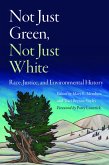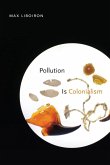Mary E. Mendoza, Traci Brynne Voyles, Patricia Nelson LimerickRace, Justice, and Environmental History
Not Just Green, Not Just White
Race, Justice, and Environmental History
Herausgeber: Mendoza, Mary E; Voyles, Traci Brynne
Mary E. Mendoza, Traci Brynne Voyles, Patricia Nelson LimerickRace, Justice, and Environmental History
Not Just Green, Not Just White
Race, Justice, and Environmental History
Herausgeber: Mendoza, Mary E; Voyles, Traci Brynne
- Broschiertes Buch
- Merkliste
- Auf die Merkliste
- Bewerten Bewerten
- Teilen
- Produkt teilen
- Produkterinnerung
- Produkterinnerung
Brings together a group of diverse contributors to explore the rich intersections between race and environment. Together these contributors demonstrate that the field of environmental history, with its core questions and critical engagement with the nonhuman world, provides a fertile context for understanding racism and ongoing colonialism as power structures in the United States.
Andere Kunden interessierten sich auch für
![Not Just Green, not Just White Not Just Green, not Just White]() Mary E. MendozaNot Just Green, not Just White106,99 €
Mary E. MendozaNot Just Green, not Just White106,99 €![In Search of Our Mothers' Gardens In Search of Our Mothers' Gardens]() Alice WalkerIn Search of Our Mothers' Gardens26,99 €
Alice WalkerIn Search of Our Mothers' Gardens26,99 €![Pollution Is Colonialism Pollution Is Colonialism]() Max LiboironPollution Is Colonialism20,99 €
Max LiboironPollution Is Colonialism20,99 €![Unsettling Truths Unsettling Truths]() Mark CharlesUnsettling Truths17,99 €
Mark CharlesUnsettling Truths17,99 €![The Collected Writings of Sherman and Grace Coolidge The Collected Writings of Sherman and Grace Coolidge]() Sherman CoolidgeThe Collected Writings of Sherman and Grace Coolidge88,99 €
Sherman CoolidgeThe Collected Writings of Sherman and Grace Coolidge88,99 €![The Other Slavery The Other Slavery]() Andres ResendezThe Other Slavery10,99 €
Andres ResendezThe Other Slavery10,99 €![The Cheyenne Indians The Cheyenne Indians]() George Bird GrinnellThe Cheyenne Indians33,99 €
George Bird GrinnellThe Cheyenne Indians33,99 €-
-
-
Brings together a group of diverse contributors to explore the rich intersections between race and environment. Together these contributors demonstrate that the field of environmental history, with its core questions and critical engagement with the nonhuman world, provides a fertile context for understanding racism and ongoing colonialism as power structures in the United States.
Produktdetails
- Produktdetails
- Verlag: University of Nebraska Press
- Seitenzahl: 536
- Erscheinungstermin: 1. Februar 2025
- Englisch
- Abmessung: 229mm x 152mm x 30mm
- Gewicht: 812g
- ISBN-13: 9781496241733
- ISBN-10: 1496241738
- Artikelnr.: 69919613
- Herstellerkennzeichnung
- Libri GmbH
- Europaallee 1
- 36244 Bad Hersfeld
- gpsr@libri.de
- Verlag: University of Nebraska Press
- Seitenzahl: 536
- Erscheinungstermin: 1. Februar 2025
- Englisch
- Abmessung: 229mm x 152mm x 30mm
- Gewicht: 812g
- ISBN-13: 9781496241733
- ISBN-10: 1496241738
- Artikelnr.: 69919613
- Herstellerkennzeichnung
- Libri GmbH
- Europaallee 1
- 36244 Bad Hersfeld
- gpsr@libri.de
Mary E. Mendoza is an assistant professor of history and Latino/a studies at Pennsylvania State University. She is the author of several journal articles and book chapters about the intersections of race, environment, health, and disability. Traci Brynne Voyles is a professor and department head of history at North Carolina State University. She is the author of The Settler Sea: California’s Salton Sea and the Consequences of Colonialism (Nebraska, 2021) and Wastelanding: Legacies of Uranium Mining in Navajo Country. Patty Limerick is a professor of history at the University of Colorado and the author of Desert Passages, The Legacy of Conquest, and Something in the Soil.
Foreword: Surveying a Field of Study
Patty Limerick
Introduction: Environmental History and White Settler Supremacy
Mary E. Mendoza and Traci Brynne Voyles
Section I: Not Just Green: Environmental Histories of Bodies, Trash,
Prisons, and Cities
Chapter 1: Naturalizing Difference: Labor and Slavery in Colonial Georgia
Katherine Johnston
Chapter 2: Dirty Work Reconsidered: On the Historical Dynamics of Labor,
Waste, and Race in Industrial Society
Carl A. Zimring
Chapter 3: “The City of Destruction”: The Chicago School of Sociology’s
Ecological Interpretation of Race, Migration, and Inequality
Elizabeth Grennan Browning
Chapter 4: Collective Memory for the African Motherland in Interwar Black
Chicago and the Limits of the Environmental Justice Model
Colin Fisher
Chapter 5: States of Confinement and Ecological Violence: Incarceration and
the Struggle for Environmental Justice
David Naguib Pellow
Section II: Almost Green, But Not Quite: New Perspectives on the
Environmental History of Parks and other Green(ish) Places
Chapter 6: Islands of Freedom: The Struggle to Desegregate Shenandoah and
Great Smoky Mountain National Park, 1936-1941
Teona Williams
Chapter 7: Conserving Whiteness: The Crisis of Tenancy and New Deal Rural
Rehabilitation in the Cotton South
Kathryn Taylor Morse
Chapter 8: Harvest of Self-Help: The Politics and Paradoxes of Southeast
Asian Refugee Community Gardens
Cecilia Tsu
Section III: Not Just White: Diverse Environmentalisms & Environmental
Narratives in Historical Perspective
Chapter 9: Amputated from the Land: Black Refugees from America and the
Racialized Roots of the Environmentalism-Environmental Justice Divide
Bryon Williams
Chapter 10: Glen Canyon Dam, Rainbow Bridge, and Hole-in-the Rock:
Diversifying Environmentalisms and the Struggle over “Sacred” Landmarks in
the American West
Erika Bsumek
Chapter 11: “How Would You Feel If Someone Were Allowed to Kill One of Your
Grandparents?”: Native Hawaiian Opposition to the Pacific Shark Fin Trade
Miles A. Powell
Chapter 12: Radical Presence – The Shadows take Shape: African Americans
(Re)making a Green World
Carolyn Finney
Section IV: Decolonizing Justice: Indigenous Environmentalisms and
Struggles over Meaning, Power, and Privilege
Chapter 13: Turnerian, Si! Americano No!: Disentangling Nature,
Exceptionalism, and the Whiteness of the American Immigration Story
Mary E. Mendoza
Chapter 14: Pushed Into the Margins: Native Women and Environment in
Settler California
Traci Brynne Voyles
Chapter 15: From Idle No More to Standing Rock & the Fight for Indigenous
Environmental Justice
Kent Blansett
Chapter 16: Seeing the Trees: The Fight for Cultural Sovereignty along the
Banks of Sand Creek
Ari Kelman
Conclusion: Transforming the Field, Transforming the Future
Mary E. Mendoza Traci Brynne Voyles
Patty Limerick
Introduction: Environmental History and White Settler Supremacy
Mary E. Mendoza and Traci Brynne Voyles
Section I: Not Just Green: Environmental Histories of Bodies, Trash,
Prisons, and Cities
Chapter 1: Naturalizing Difference: Labor and Slavery in Colonial Georgia
Katherine Johnston
Chapter 2: Dirty Work Reconsidered: On the Historical Dynamics of Labor,
Waste, and Race in Industrial Society
Carl A. Zimring
Chapter 3: “The City of Destruction”: The Chicago School of Sociology’s
Ecological Interpretation of Race, Migration, and Inequality
Elizabeth Grennan Browning
Chapter 4: Collective Memory for the African Motherland in Interwar Black
Chicago and the Limits of the Environmental Justice Model
Colin Fisher
Chapter 5: States of Confinement and Ecological Violence: Incarceration and
the Struggle for Environmental Justice
David Naguib Pellow
Section II: Almost Green, But Not Quite: New Perspectives on the
Environmental History of Parks and other Green(ish) Places
Chapter 6: Islands of Freedom: The Struggle to Desegregate Shenandoah and
Great Smoky Mountain National Park, 1936-1941
Teona Williams
Chapter 7: Conserving Whiteness: The Crisis of Tenancy and New Deal Rural
Rehabilitation in the Cotton South
Kathryn Taylor Morse
Chapter 8: Harvest of Self-Help: The Politics and Paradoxes of Southeast
Asian Refugee Community Gardens
Cecilia Tsu
Section III: Not Just White: Diverse Environmentalisms & Environmental
Narratives in Historical Perspective
Chapter 9: Amputated from the Land: Black Refugees from America and the
Racialized Roots of the Environmentalism-Environmental Justice Divide
Bryon Williams
Chapter 10: Glen Canyon Dam, Rainbow Bridge, and Hole-in-the Rock:
Diversifying Environmentalisms and the Struggle over “Sacred” Landmarks in
the American West
Erika Bsumek
Chapter 11: “How Would You Feel If Someone Were Allowed to Kill One of Your
Grandparents?”: Native Hawaiian Opposition to the Pacific Shark Fin Trade
Miles A. Powell
Chapter 12: Radical Presence – The Shadows take Shape: African Americans
(Re)making a Green World
Carolyn Finney
Section IV: Decolonizing Justice: Indigenous Environmentalisms and
Struggles over Meaning, Power, and Privilege
Chapter 13: Turnerian, Si! Americano No!: Disentangling Nature,
Exceptionalism, and the Whiteness of the American Immigration Story
Mary E. Mendoza
Chapter 14: Pushed Into the Margins: Native Women and Environment in
Settler California
Traci Brynne Voyles
Chapter 15: From Idle No More to Standing Rock & the Fight for Indigenous
Environmental Justice
Kent Blansett
Chapter 16: Seeing the Trees: The Fight for Cultural Sovereignty along the
Banks of Sand Creek
Ari Kelman
Conclusion: Transforming the Field, Transforming the Future
Mary E. Mendoza Traci Brynne Voyles
Foreword: Surveying a Field of Study
Patty Limerick
Introduction: Environmental History and White Settler Supremacy
Mary E. Mendoza and Traci Brynne Voyles
Section I: Not Just Green: Environmental Histories of Bodies, Trash,
Prisons, and Cities
Chapter 1: Naturalizing Difference: Labor and Slavery in Colonial Georgia
Katherine Johnston
Chapter 2: Dirty Work Reconsidered: On the Historical Dynamics of Labor,
Waste, and Race in Industrial Society
Carl A. Zimring
Chapter 3: “The City of Destruction”: The Chicago School of Sociology’s
Ecological Interpretation of Race, Migration, and Inequality
Elizabeth Grennan Browning
Chapter 4: Collective Memory for the African Motherland in Interwar Black
Chicago and the Limits of the Environmental Justice Model
Colin Fisher
Chapter 5: States of Confinement and Ecological Violence: Incarceration and
the Struggle for Environmental Justice
David Naguib Pellow
Section II: Almost Green, But Not Quite: New Perspectives on the
Environmental History of Parks and other Green(ish) Places
Chapter 6: Islands of Freedom: The Struggle to Desegregate Shenandoah and
Great Smoky Mountain National Park, 1936-1941
Teona Williams
Chapter 7: Conserving Whiteness: The Crisis of Tenancy and New Deal Rural
Rehabilitation in the Cotton South
Kathryn Taylor Morse
Chapter 8: Harvest of Self-Help: The Politics and Paradoxes of Southeast
Asian Refugee Community Gardens
Cecilia Tsu
Section III: Not Just White: Diverse Environmentalisms & Environmental
Narratives in Historical Perspective
Chapter 9: Amputated from the Land: Black Refugees from America and the
Racialized Roots of the Environmentalism-Environmental Justice Divide
Bryon Williams
Chapter 10: Glen Canyon Dam, Rainbow Bridge, and Hole-in-the Rock:
Diversifying Environmentalisms and the Struggle over “Sacred” Landmarks in
the American West
Erika Bsumek
Chapter 11: “How Would You Feel If Someone Were Allowed to Kill One of Your
Grandparents?”: Native Hawaiian Opposition to the Pacific Shark Fin Trade
Miles A. Powell
Chapter 12: Radical Presence – The Shadows take Shape: African Americans
(Re)making a Green World
Carolyn Finney
Section IV: Decolonizing Justice: Indigenous Environmentalisms and
Struggles over Meaning, Power, and Privilege
Chapter 13: Turnerian, Si! Americano No!: Disentangling Nature,
Exceptionalism, and the Whiteness of the American Immigration Story
Mary E. Mendoza
Chapter 14: Pushed Into the Margins: Native Women and Environment in
Settler California
Traci Brynne Voyles
Chapter 15: From Idle No More to Standing Rock & the Fight for Indigenous
Environmental Justice
Kent Blansett
Chapter 16: Seeing the Trees: The Fight for Cultural Sovereignty along the
Banks of Sand Creek
Ari Kelman
Conclusion: Transforming the Field, Transforming the Future
Mary E. Mendoza Traci Brynne Voyles
Patty Limerick
Introduction: Environmental History and White Settler Supremacy
Mary E. Mendoza and Traci Brynne Voyles
Section I: Not Just Green: Environmental Histories of Bodies, Trash,
Prisons, and Cities
Chapter 1: Naturalizing Difference: Labor and Slavery in Colonial Georgia
Katherine Johnston
Chapter 2: Dirty Work Reconsidered: On the Historical Dynamics of Labor,
Waste, and Race in Industrial Society
Carl A. Zimring
Chapter 3: “The City of Destruction”: The Chicago School of Sociology’s
Ecological Interpretation of Race, Migration, and Inequality
Elizabeth Grennan Browning
Chapter 4: Collective Memory for the African Motherland in Interwar Black
Chicago and the Limits of the Environmental Justice Model
Colin Fisher
Chapter 5: States of Confinement and Ecological Violence: Incarceration and
the Struggle for Environmental Justice
David Naguib Pellow
Section II: Almost Green, But Not Quite: New Perspectives on the
Environmental History of Parks and other Green(ish) Places
Chapter 6: Islands of Freedom: The Struggle to Desegregate Shenandoah and
Great Smoky Mountain National Park, 1936-1941
Teona Williams
Chapter 7: Conserving Whiteness: The Crisis of Tenancy and New Deal Rural
Rehabilitation in the Cotton South
Kathryn Taylor Morse
Chapter 8: Harvest of Self-Help: The Politics and Paradoxes of Southeast
Asian Refugee Community Gardens
Cecilia Tsu
Section III: Not Just White: Diverse Environmentalisms & Environmental
Narratives in Historical Perspective
Chapter 9: Amputated from the Land: Black Refugees from America and the
Racialized Roots of the Environmentalism-Environmental Justice Divide
Bryon Williams
Chapter 10: Glen Canyon Dam, Rainbow Bridge, and Hole-in-the Rock:
Diversifying Environmentalisms and the Struggle over “Sacred” Landmarks in
the American West
Erika Bsumek
Chapter 11: “How Would You Feel If Someone Were Allowed to Kill One of Your
Grandparents?”: Native Hawaiian Opposition to the Pacific Shark Fin Trade
Miles A. Powell
Chapter 12: Radical Presence – The Shadows take Shape: African Americans
(Re)making a Green World
Carolyn Finney
Section IV: Decolonizing Justice: Indigenous Environmentalisms and
Struggles over Meaning, Power, and Privilege
Chapter 13: Turnerian, Si! Americano No!: Disentangling Nature,
Exceptionalism, and the Whiteness of the American Immigration Story
Mary E. Mendoza
Chapter 14: Pushed Into the Margins: Native Women and Environment in
Settler California
Traci Brynne Voyles
Chapter 15: From Idle No More to Standing Rock & the Fight for Indigenous
Environmental Justice
Kent Blansett
Chapter 16: Seeing the Trees: The Fight for Cultural Sovereignty along the
Banks of Sand Creek
Ari Kelman
Conclusion: Transforming the Field, Transforming the Future
Mary E. Mendoza Traci Brynne Voyles








